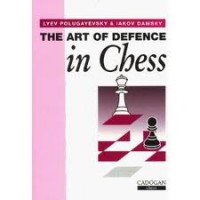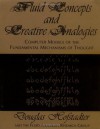251
Followers
4
Following
Manny Rayner's book reviews
I love reviewing books - have been doing it at Goodreads, but considering moving here.
Currently reading
The Greatest Show On Earth: The Evidence For Evolution
R in Action
Fluid Concepts and Creative Analogies
McGee on Food and Cooking: An Encyclopedia of Kitchen Science, History and Culture
Epistemic Dimensions of Personhood
Pattern Recognition and Machine Learning (Information Science and Statistics)
Relativity, Thermodynamics and Cosmology
The Cambridge Handbook of Second Language Acquisition
Art of Defence in Chess: Defence and Counterattack Techniques in Chess
 An interesting fact about chess literature: although attack and defence are equally important, there must be at least twenty books on attacking techniques for every one on defence. More likely it's fifty, or even a hundred.
An interesting fact about chess literature: although attack and defence are equally important, there must be at least twenty books on attacking techniques for every one on defence. More likely it's fifty, or even a hundred. I wonder why this is? I've never really thought about it before, but now it occurs to me to compare with debugging in software engineering. Every software engineer knows that you spend most of your time debugging programs to find out why they're not working. But, somehow, when you look at the literature, there is shockingly little about the theory of debugging. I remember talking with a couple of very smart people from MIT who'd studied under the legendary Marvin Minsky. One of them had had some cute ideas about how develop better debuggers, but had not been able to get funding to pursue his work.
"If you're debugging, you've done something wrong," he said. "People don't like to admit they've done something wrong. Writing debugging software feels like you're just encouraging them." Or words to that effect - we had this conversation sometime in the 80s.
Well, defence in chess is similar. You did something wrong earlier, and now your opponent has the initiative. You have to figure out where he's trying to attack, and parry his threats. How dull! How frustrating! Really, you shouldn't ever have got into this stupid position. It's your fault.
Yes... on mature consideration, why on earth would you want to read a book on defence? Buy another half dozen books on opening theory, and make sure you don't have to suffer through any more of those those drab, soul-destroying defensive battles. Oh, and playing perfectly is another useful component in this scheme. Then you definitely won't have any use for Polugayevsky and Damsky's obscure little treatise.
________________________________________________
After posting the review, I was surprised by the number of comments which suggested that defence is in principle an impossible task. I hadn't realised to what extent we were straying into the realm of philosophy! Polugayevsky is often like that - in a few hundred years, I think he'll he classified as a romantic philosopher who just happened to be a chess-player.
But going back to the concept of "defence". The most fundamental choice, which underlies everything else, is whether to defend or to counter-attack. Learning to make good decisions here is, more than anything else, what distinguishes a gifted defensive player from an indifferent one.
It's possible to get it wrong in either direction, and I'm surprised to see how directly the considerations carry over to the real world: yes, this is indeed philosophy! So, a classic case where people incorrectly defended instead of counter-attacking was the leadup to WW II. Germany was evidently planning to launch an attack, and Britain decided to maintain a passive stance and avoid open confrontation. As everyone now agrees, this was absolutely the wrong decision, with Munich just being the last and biggest mistake. The whole strategy was misconceived from the start.
In the opposite direction, and somewhat more controversially, I would argue that George W. Bush got suckered by Osama bin Laden in 2001. Bin Laden launched an unexpected attack on the US that killed several thousand people. I think that his real purpose was to lure the US into a poorly thought out counter-attack, and that he succeeded beyond his wildest dreams. At the time, Bush kept drawing parallels with Hitler and WW II, but these parallels were misleading. Hitler's Germany was a major military power, and there was no hope of containing it. Saddam's Iraq was weak, and could easily have been contained; on top of everything else, Saddam wasn't even allied with bin Laden. Bush got it just as wrong as Chamberlain, but in the opposite direction.
Of course, all of the above analysis is speculative. In chess, which is a brilliantly conceived microcosm of human conflict, you can analyse exactly and reach hard conclusions about the relative merits of defending and counter-attacking. It's a very interesting subject.











